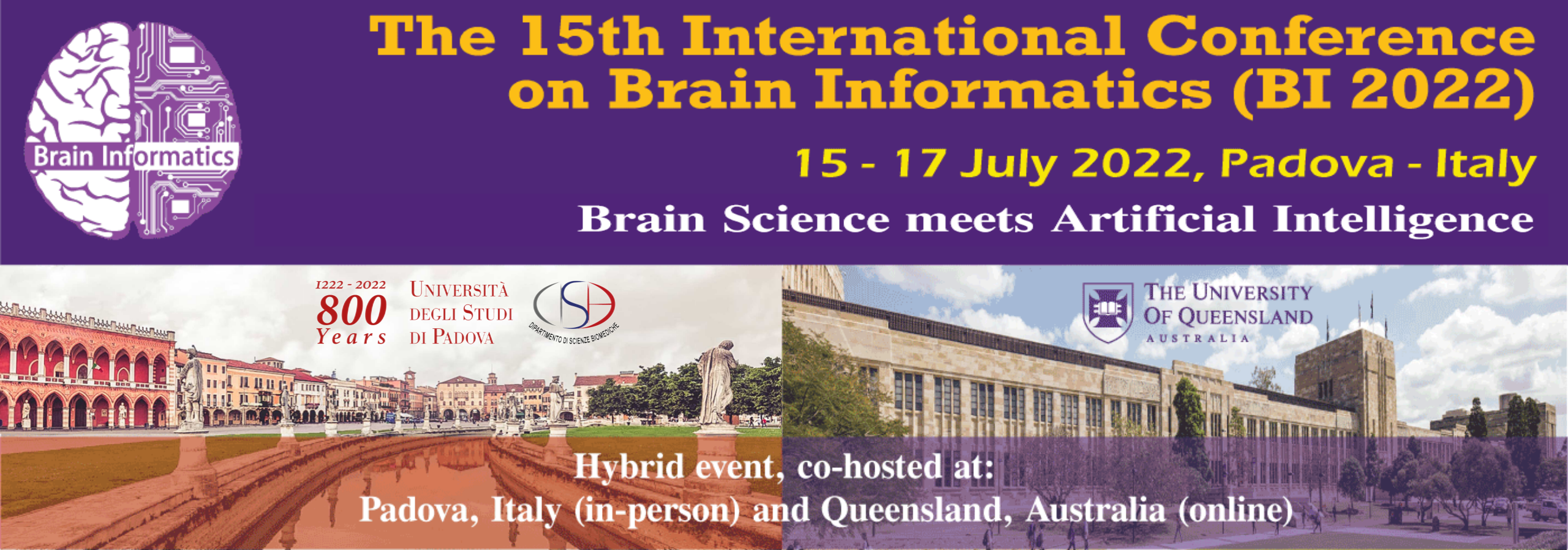BI'22 Tracks and Topics
Track 1: Cognitive and Computational Foundations of Brain Science
Brain dynamics
Structural and functional connectome
Neural foundations of intelligent behavior
Learning mechanisms (e.g., stability, personalized user/student models)
Multi-perception mechanisms and visual, auditory, and tactile information processing
Reasoning mechanisms (e.g., principles of deductive/inductive reasoning, common-sense reasoning, decision making, and problem solving)
Neural basis of decision-making
Models of executive function & prefrontal cortex
Higher-order cognitive functions and their relationships
Adaptation and self-organization
Digital, data, and computational brain
Methodologies for systematic design of cognitive experiments
Neuroeconomics and neuromarketing
Neuroeducation, neurolinguistics, and neuroinstrumentation
Track 2: Investigations of Human Information Processing Systems (HIPS)
Bayesian models of the brain, and causal modeling of behaviour for neurology
Cognitive architectures and their relations to fMRI/EEG/MEG
Computational mechanisms of learning and memory
Computational models of sensory-motor control
Conscious mental functions and subconscious information processing
Emotion, heuristic search, information granularity, and autonomy related issues in reasoning and problem solving
HIPS complex systems
Investigating spatiotemporal characteristics and flow in HIPS and the related neural structures and neurobiological process
Modeling brain information processing mechanisms (e.g., information organization, neuro mechanism, mathematical, cognitive and computational models of HIPS)
Social brain communication
Track 3: Brain Big Data Analytics, Curation and Management
Big-neuron, neuron morphology and neuron reconstruction
Brain data collection, pre-processing, management, and analysis methodologies
Brain connectome, functional connectivity, and multi-level brain networks
Brain data grids and brain research support services
Brain informatics provenances
Brain mapping and visualization
Cyber-individuals and individual differences
Data brain modeling and formal conceptual models of brain data
Databasing the brain, curating big data, and constructing brain data centers
Development of data-driven markers of diseases, and behavioral biomarkers of neurological diseases
fMRI and PET imaging registration and analysis
Information technologies for simulating brain data
Integrating multiple forms of brain big data obtained from atomic and molecular levels to the entire brain
Knowledge representation and discovery in neuroimaging
Large scale models and simulation of brains
Machine learning algorithms for brain data analysis
Measuring scale thresholds of brain big data
Multi-aspect analysis in fMRI/DTI/EEG/ERP/MEG/PET/Eye-tracking data
Multimedia brain data mining and reasoning
Multimodal and combinatorial fusion for brain informatics
Optogenetics and in-vivo cell imaging analytics
Real-time fMRI and neurofeedback
Remote neurological assessment
Semantic technology for brain data integration
Simulating and analyzing spatiotemporal structure, characteristics and flows in HIPS and neural data
Statistical analysis and pattern recognition in neuroimaging
Cloud and semantic brain data services
Track 4: Informatics Paradigms for Brain and Mental Health Research
e-Science, e-Health, and e-Medicine
Mental healthcare knowledge abstraction, classification, representation, and summarization
Mental healthcare knowledge computerization, execution, inference, and management
Mental health risk evaluation and modeling
Personal, wearable, ubiquitous, micro and nano devices for mental healthcare
Remote neurological assessment
Social networks, social media, and e-learning for spreading mental health awareness
WaaS (Wisdom as a Service) and active services for mental healthcare
Computational approaches to rehabilitation
Computational intelligence methodologies for mental healthcare
Computational psychiatry
Brain repair models and stimulations
Clinical diagnosis and pathology of brain and mind/mental-related diseases (e.g., mild cognitive impairment, alzheimers, dementia & neuro-degeneration, depression, epilepsy, autism, Parkinson’s disease, and cerebral palsy)
Track 5: Brain-Machine Intelligence and Brain-Inspired Computing
Brain-inspired artificial intelligence
Brain-inspired cognitive computation and modeling
Brain-inspired artificial neural networks
Brain-inspired information processing
Brain-inspired evolutionary systems
Brain-inspired machine learning
Brain-inspired / cognitive neuro robotics
Brain-inspired / neuromorphic computing
Affective computing and applications
Brain-computer interaction and brain-robot interaction
Brains connecting to the internet of things
